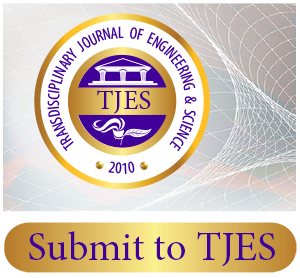| Information |
|---|
| For Readers |
| For Authors |
| For Librarians |
Aims & Scope
The Transdisciplinary Journal of Engineering & Science (TJES) (ISSN 1949-0569) is a peer-reviewed, open-access annually published journal that bridges the gap between science, engineering, art, culture, spirituality, and society to solve societal complex problems. This journal publishes transdisciplinary research findings covering some of today’s most urgent global challenges, such as climate change, poverty reduction, cybersecurity, diversity, immigration, the impact of technological changes on future jobs and skills, social innovation in the era of career displacement, the role of disruption, planning for the 22nd century, sustainable development, research on social contemporary issues, transdisciplinary artistic practices & research, and education for the convergent future. The activity of specific research and educational achievements through transdisciplinary initiatives within the medical field is highly encouraged.
IMPORTANT
Manuscripts that do not contribute to transdisciplinary research will be deemed outside the scope of this journal. The manuscript should include a section that thoroughly describes the transdisciplinary research process. Additionally, the manuscript must articulate its relation to previously published papers in the Journal of Transdisciplinary Engineering & Science.
The following specific transdisciplinary research areas in the medical field are strongly encouraged:
Transdisciplinary research in the medical field refers to a collaborative research strategy that synthesizes knowledge and insights from a range of disciplines, such as social sciences, economics, engineering, and public health, in addition to medicine. This approach is designed to address complex health issues by considering the social, environmental, and behavioral determinants that influence health outcomes. By exceeding the limitations of conventional medical research, it aims to create more integrated solutions, ultimately working towards a comprehensive understanding of the complex health challenges through the collaboration of diverse fields of expertise.
Researchers are advised to contribute manuscripts that explore the applications of 3D printing in the medical field. This includes a comprehensive study of additive manufacturing (AM) processes and materials that are relevant to both medical and dental uses. In the healthcare sector, additive manufacturing is essential to produce critical items, including medical devices and prosthetics, utilizing biocompatible materials to develop devices, implants, and even human tissue.
Fundamental characteristics of transdisciplinary research in medicine extend their focus beyond the clinical environment highlighting the importance of teamwork across different fields, the blending of various expertise, and the commitment to solving multifaceted health problems through comprehensive and innovative strategies.
: Some examples of transdisciplinary research in the field of medicine:
- Exploring the relationship between determinants like poverty, educational resources, and healthcare access and their effects on health outcomes in a specific community.
- Creating programs that incorporate modifications in lifestyle, dietary counseling, and community engagement to effectively manage chronic illnesses like diabetes and obesity..
- Investigating the influence of healthcare policies on the availability of care and the health results experienced by diverse demographic groups.
- Evaluating the impact of environmental elements such as air pollution on respiratory illnesses and formulating strategies for their reduction.


